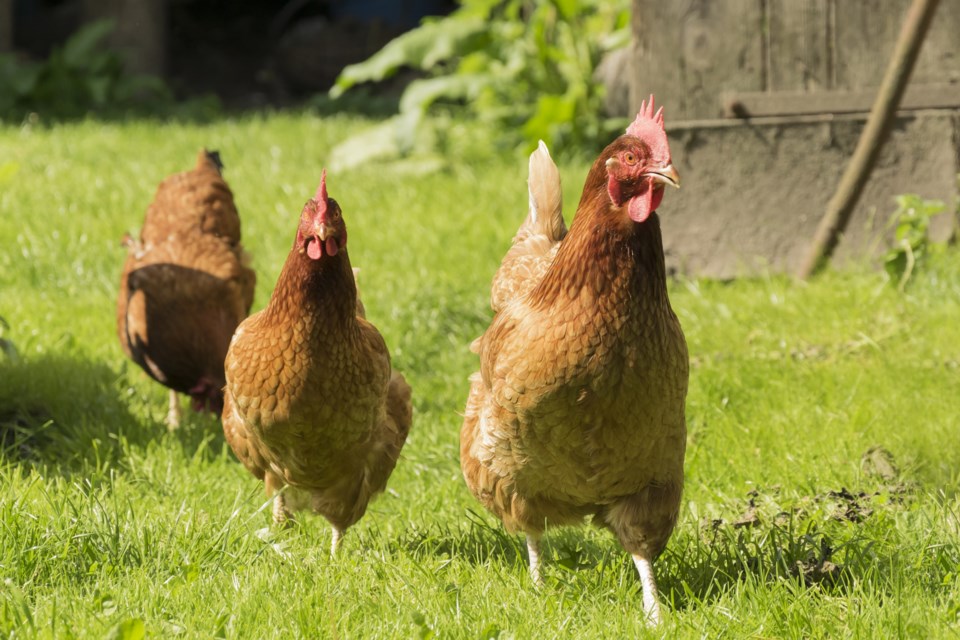Some predicted that feathers would be flying at Wednesday morning’s Pelham Town Council meeting at the Meridian Community Centre, at which discussion took place regarding a proposed bylaw allowing egg-producing chickens in urban yards in Pelham. But it ended up being a polite affair, with local resident Mark Korchok speaking on behalf of the pro-fowl delegation of about 20 residents, followed by Town councillors offering their own positions on the issue.
Korchok said that while he does not currently own chickens, he has managed small flocks at previous residences in the past, and offered insights focusing on such potential concerns as odour, noise, rodent attraction, and avian flu.
“A license system which would include provisions for smell complaints could mitigate any problems, as well as ensure the owners are aware of their responsibilities,” he suggested.
Korchok said that a bylaw in Kitchener established that chicken coops were required to be 2.5 metres away from side yard lot lines, and 1.2 metres away from rear lot lines. He opined that the five metre and 10 metre setback distances noted in the Pelham Agriculture Committee’s recommendations “seem excessive.”
In recent years, avian flu has been in the news with headlines citing millions of poultry deaths in Canada, including many in Niagara. Korchok noted that most of these occurrences were on commercial farms, which can house tens of thousands of birds, all of which must be culled when an outbreak occurs.
Korchok quoted Doctor David Waltner-Toews, a veterinary epidemiologist and professor at the University of Guelph, who has followed avian flu for years.
“The risks of disease transmission from small backyard flocks to people are no higher (and probably lower) than those from pet dogs, cats, caged birds, pigeons, and urban wildlife. The general scientific consensus is that the most effective approach to managing the risks related to backyard hens and HPAI (highly pathogenic avian influenza) should be similar to that taken for those other (higher risk) pets. The threat of avian influenza is serious, but can be managed. In my decades of research and practice, I have found no evidence that a small backyard flock is a danger to the planet or food security. Waterfowl such as ducks and geese are the natural reservoir for influenza viruses, so an essential part of preventing the spread of avian influenza is to not let the backyard hens interact with them.”
As long as chickens are not in contact from water that's been in contact with waterfowl, and they do not share food, avian flu in urban hens should not be an issue, said Korchok. Hens would not be free-range, but confined to the coops, which must be pest proof.
“Outside of Ontario and Canada, urban hens are a common thing,” said Korchok. “We have a growing list of 16 cities in Ontario with bylaws allowing urban hens, and for good reason. They turn food scraps into compost, and provide free, delicious eggs that didn't come from a factory. But most of all [hens] are great company. The owners of these small flocks see their birds as pets. They love and dote on them the same as they would dogs or cats.”
Town staff had prepared a Backyard Hen Licensing Bylaw Recommendation, which council unanimously received. The bylaw, which will be subject to approval at the next council meeting, would “permit, regulate, and license” hens in the Town of Pelham on residential properties where they are currently prohibited, and would apply to rural properties as well. A maximum of six hens would be allowed in rear yards, subject to meeting the minimum lot size and setback requirements. The staff report provided specific details on the structure of a licensing by-law, including hen coop and run requirements, and feed and waste storage and disposal requirements. The report also outlined the application process, including the fee structure, licensing requirements, enforcement options, and education materials.
A copy of the proposed draft Licensing By-law is available at https://pelham-pub.escribemeetings.com/filestream.ashx?DocumentId=32596.
Councillor Wayne Olson agreed with Korchok that the setback distance suggested in the staff report (five metres and 10 metres from the side and rear property lines) for the chicken coops was excessive, and suggested that a two to two and a half metre setback would be sufficient. However, Councillor Kevin Ker, council’s representative on the Agriculture Committee which worked on the bylaw, noted that Niagara Falls has a bylaw for urban hens requiring a five and 10 metre setback, and that within the Niagara region, a number of municipalities have banned the keeping of urban chickens.
Councillor Shellee Niznik, who supported the bylaw proposal as written by staff, said that council had received complaints from many urban families in Pelham regarding neighbours having chickens in their yards, and the Town needed to be respectful of their sentiments as well.
Councillor Brian Eckhardt told those assembled that “I made it very clear when I decided to run for council that I was in favour of urban hens, subject to certain regulations. I think the Agriculture Committee has done a tremendous job on this, and although I have some questions about the setbacks and the size of the lots, I think it's a good compromise. We're not going to make everybody happy with whatever decision we make. I think the first step is to get this passed, and then down the road, we can make changes as necessary.”
Mayor Marvin Junkin, a self-proclaimed “country boy, born and raised in north Pelham,” spoke of “some residents telling me that they did not buy a million and a half dollar property in town, to wake up in the morning to smell chickens on the other side of the fence. I'm definitely for a minimum lot size, but think that the suggested setbacks are somewhat excessive. This will be a council decision, and we know that we definitely aren't going to walk away from this with everyone happy.”



